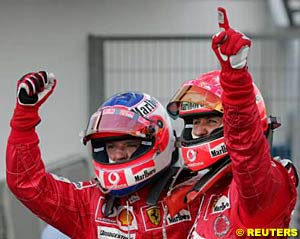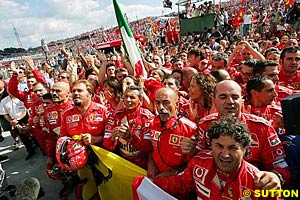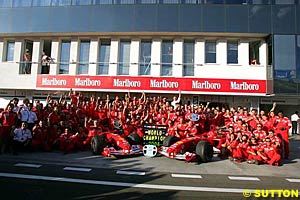
Atlas F1 Magazine Writer
With victory at Sunday's Hungarian Grand Prix, Ferrari secured an unprecedented sixth consecutive constructors' title to continue with their total dominance of Formula One. Atlas F1's Richards Barnes reviews the Italian team's formula for success and analyses the chances of their rivals finally stopping their streak in a near future
During the race, ITV commentator Mark Blundell ventured that Schumacher was aiming to lap Renault's third-placed driver (and 2003 winner) Fernando Alonso as payback for the humiliation of 2003. Schumacher has no need for such redundant gestures. After winning 12 of the 13 GP so far in 2004, any further gesture of superiority would be overkill on the German's part.
Whatever negative effect Ferrari's superiority may be having on F1 as a competitive spectacle, the team from Maranello cannot be faulted on their performance. The core principle of all professional sport is to win as consistently and comprehensively as possible. By any historical precedent, Jean Todt's current outfit has turned that goal into an artform.
A statistical comparison illustrates the difference between the six titles under Todt and the eight that preceded the Frenchman's tenure. Ferrari's previous constructors' triumphs in 1961, 1964, 1975-77, 1979 and 1982/3 yielded 37 race wins from 111 starts. During the six titles of the Todt era, the team have amassed 60 wins from 96 starts. If Schumacher (and teammate) can add another 31 GP wins before the German's retirement, then exactly 50% of Ferrari's total wins (105 from 210) will have been achieved during Schumacher's tenure with the team.
It's a level of consistency and high performance that won't be emulated by any other team in the foreseeable future, perhaps ever. For, although the Ferrari recipe has been both simple and transparent, their rivals are either unwilling or unable to apply the same team-building ethic for success.
It took a unique combination of factors to catalyse Ferrari's recent success: the death of Ayrton Senna leaving Schumacher as the sport's standout talent, Ferrari's decision to hire the best driver in the world and build the team around him, and Schumacher's insistence on having ex-Benetton colleagues Ross Brawn and Rory Byrne follow him to Maranello. Added to that is the Scuderia's seemingly inexhaustible resources, and the availability of a bespoke engine and (lately) bespoke Bridgestone tyres.
Perhaps most important was the patience and sheer self-belief of the entire organisation. The scandal of Jerez 1997, the blown opportunities at Spa and Suzuka 1998, and the crisis of Schumacher's season-ending crash at Silverstone in 1999 could all have resulted in loss of belief and the breakdown of the unit.
The bad news for Ferrari's rivals is that this continuity looks to remain intact until at least 2006. All team principals are agreed that they need to work harder and aim higher in order to pose a legitimate challenge to the Scuderia. However, it's no longer sufficient to merely hope that Ferrari become apathetic and overconfident, that Michael Schumacher will have a mediocre year, that the next generation Ferrari engine will prove unreliable or that designer Rory Byrne's next chassis will lag in terms of aerodynamic efficiency.
At best, the rival teams can hope that Michelin rediscover their 2003 form without creative interpretation of the rules to achieve such performance. Although relying solely on a third party tyre supplier to provide answers is not satisfactory. That leaves rival teams with three options: grin and bear it until Michael Schumacher's retirement, beat Ferrari at their own 'franchise driver' game, or come up with an alternative team strategy for consistent success.
For obvious reasons, the 'grin and bear it' option is not acceptable to anybody with the ultra-competitive nature to seek glory in F1. The 'franchise driver' option is a proven success in Ferrari's case, and may be worth trying to copy. However, no clear successor to Schumacher's throne has emerged, at least none who inspire the level of trust and confidence that Ferrari placed in Schumacher.
Intriguingly, even if a candidate emerged from the throng of rising stars like Fernando Alonso, Mark Webber, Kimi Raikkonen or Jenson Button, there is no guarantee that any team (even Ferrari) could duplicate the success of 'Team Schumacher'. After the Beatles split up, John Lennon said, "Our success is a combination of a lot of things. If I knew exactly what, I'd form another group on the same formula. But I haven't got a clue."
Historical purists may mutter about Ferrari breaching the ethics and spirit of the sport, and race fans may grumble about the monotony of Ferrari's domination. For both, there is the reassurance that the Schumacher phenomenon may prove to be a historical freak, much like the Beatles were. Although motor racing engineering success is built on more tangible and measurable criteria than pop culture, it is nevertheless a high risk for any F1 team owner to bet the farm on a single franchise driver.
Given the recent bout of musical chairs in the driver market, few teams will be able to match Ferrari's continuity in the near future. Kimi Raikkonen and Fernando Alonso are looking well settled at McLaren and Renault respectively, although it will still take time before either has the machinery or support structures to challenge Schumacher consistently. Until then, Ferrari will look to extend their already unprecedented winning streak, and leave a benchmark that will stand forever.
The Hungaroring circuit outside Budapest may not have been the most historic or poignant venue to clinch a sixth consecutive Constructors' Championship. But the team members at Ferrari have grown accustomed to winning, and will take their triumphs as and when they come. When a team shuts out the opposition from all but one race in the season, it makes little difference whether the title comes in July, August or September. Even Ferrari's trademark understating of their own superiority cannot disguise the fact that championship glory was a virtual certainty by June, if not earlier.
 For the rest of the field, and the great majority of the sport's fans and observers, Sunday's 2004 Hungarian Grand Prix represented more of the same – disbelief as Ferrari once again vanished effortlessly into the distance. And this on a circuit where, exactly one year ago, World Champion Michael Schumacher had been lapped on his way to eventual eighth place.
For the rest of the field, and the great majority of the sport's fans and observers, Sunday's 2004 Hungarian Grand Prix represented more of the same – disbelief as Ferrari once again vanished effortlessly into the distance. And this on a circuit where, exactly one year ago, World Champion Michael Schumacher had been lapped on his way to eventual eighth place.
 With Ferrari's growing desperation to break the prolonged championship drought, it would have been understandable if they'd lost patience and ditched the plan in search of more immediate gratification. Instead, each of the core individuals remained focused on the task at hand, and the result has been a continuity and team spirit that is unmatched in F1 and probably anywhere in motor sport.
With Ferrari's growing desperation to break the prolonged championship drought, it would have been understandable if they'd lost patience and ditched the plan in search of more immediate gratification. Instead, each of the core individuals remained focused on the task at hand, and the result has been a continuity and team spirit that is unmatched in F1 and probably anywhere in motor sport.
 Instead, proven winners like Williams and McLaren will persevere with the time-honoured tradition of engineering the finest machines in the pitlane, cars that don't need a franchise driver to win. Nevertheless, Ferrari's freakish dominance in 2004 must perforce influence the way that team owners and other key personnel will approach the business of winning in the future. Even if the franchise driver format cannot be replicated, Ferrari have given an abject lesson in the long-term benefits of team personnel continuity and cohesion, and of the rewards of mutual loyalty between driver and team.
Instead, proven winners like Williams and McLaren will persevere with the time-honoured tradition of engineering the finest machines in the pitlane, cars that don't need a franchise driver to win. Nevertheless, Ferrari's freakish dominance in 2004 must perforce influence the way that team owners and other key personnel will approach the business of winning in the future. Even if the franchise driver format cannot be replicated, Ferrari have given an abject lesson in the long-term benefits of team personnel continuity and cohesion, and of the rewards of mutual loyalty between driver and team.
|
Contact the Author Contact the Editor |
Please Contact Us for permission to republish this or any other material from Atlas F1.
|
Volume 10, Issue 33
Articles
Formula What?
Bjorn Wirdheim: Going Places
Ann Bradshaw: Point of View
2004 Hungarian GP Review
2004 Hungarian GP Review
Technical Review: Hungary 2004
The Business of Winning
Stats Center
Qualifying Differentials
SuperStats
Charts Center
Columns
The F1 Insider
Season Strokes
On the Road
Elsewhere in Racing
The Weekly Grapevine
> Homepage |